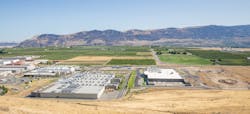Data Centers – A Resilient Economic Lifeline Through the Pandemic
Darob Malek-Madani and Samuel Bendix, or National Real Estate Advisors LLC, explore how data centers have performed as an ‘economic lifeline’ and bright spot through the COVID-19 pandemic.
Samuel Bendix, Managing Director-Investor Relations, National Real Estate Advisors LLC
As much of the world has shut down while scientists race to develop a vaccine to counter COVID-19, and healthcare workers and governments work to contain the outbreak, one vital component of the world’s infrastructure, the internet, has stood out.
COVID-19’s economic impact still has to be fully understood, but the initial massive increase of online traffic and the absence of any widespread disruptions in service are evidence of the internet’s resilience under extreme pressure. As the life support system of the internet, data centers, are proving themselves to be essential to conducting business, learning, and socializing remotely. We believe that data centers will become even more vital to our way of life as society undergoes potentially permanent changes in social behavior.
The essential nature of data centers is reflected in public financial markets as, according to Nareit, data centers were the best performing public real estate sector in 2020 through the end of June. All other sectors aside from infrastructure and industrial, posted negative returns; along with devastating losses to the retail, lodging/resorts, and healthcare sectors.
Although the infrastructure sector has also performed well, it is clear that some types of infrastructure are proving to be far less essential than others. For example, water treatment plants remain as essential as ever, while toll roads and airports are suddenly empty. Even power plants have seen reduced demand as manufacturing has had to be paused or slowed in parts of the world.
Data centers and the other infrastructure of the internet continue to show significant growth in demand during the pandemic. Indeed, as societal activity has moved away from malls, theme parks, offices and hotels, it has migrated online. The suddenness of the reaction to the pandemic caused cascading spikes in internet traffic around the world. Internet traffic usage increased 20% to 30% in just a couple of days! According to several network operators, this increase accounted for all of the growth they were expecting in 2020.
Fundamentally, a data center needs to have a secure location with uninterrupted power and internet connectivity, ultimately meeting the test of remaining functional nearly 100% of the time.
Data centers’ operational performance in the face of a crisis is beyond noteworthy. Although there has been massive growth in internet usage, there have been no significant disruptions in service around the world. The resilience of the internet comes both from its fundamental decentralized design as well as the planning and operational performance of the organizations that operate it.
Darob Malek-Madani, Head of Research, National Real Estate Advisors LLC
Resilient practices are central to the design and operation of data centers. Fundamentally, a data center needs to have a secure location with uninterrupted power and internet connectivity, ultimately meeting the test of remaining functional nearly 100% of the time. Experienced data center operators typically strive to have records of downtime limited to just a few minutes over the course of years.
When it came time to respond to the COVID-19 pandemic, data center operators were prepared. Operators have business continuity plans in place for many different types of potential disruptions. As COVID-19 emerged, many began implementing these plans. As of July 2020, Sabey Data Centers was operating under response level 1 of its infectious disease business continuity plan which includes taking actions such as adjusting cleaning procedures, screening personnel for symptoms, and limiting the number of personnel on-site. Just weeks ago, operations at their colocation data centers were at level 2, which included the above, plus deferring non-essential maintenance and implementing more thorough health-related protocols on personnel on-site. If the situation were to deteriorate further, personnel are prepared to shelter in-place in data centers – for the purpose of keeping the internet functioning even as traffic continues to increase rapidly.
One factor that has allowed data centers to be resilient, is that despite a facility’s need for 24/7 monitoring, much of the work can be done remotely or with relatively few people on-site. A typical location will likely be staffed with the operator’s and tenant’s technicians and security personnel 24 hours a day. Yet, since the systems are designed to operate automatically, it is possible for a data center to operate with one person – or even no people – on-site for some period. As technology improves and things like AI become more widespread, the ability to operate with limited staffing for longer periods of time will further improve data centers’ resilience to similar crises.
Over the next few months — or years — as the danger of COVID-19 subsides, it seems quite possible that many of the social and working practices learned during the pandemic will remain to some degree. Not everyone who is working from home will continue to do so, but it is likely that once employees are used to their new lifestyle, they may not easily relinquish it. College students and universities may also realize that distance learning offers a far more cost-effective way of getting a decent education.
Both activities would contribute to increased video which is already the largest source of internet traffic. Additionally, consumers may have gotten accustomed to connecting long distance with friends over video calls in addition to meeting in person.
Ultimately, if any of these behaviors become the norm, they will add to the exponential growth of internet traffic—and data center operators will be ready to expand and meet that demand.
Darob Malek-Madani is Head of Research, and Samuel Bendix is Managing Director-Investor Relations at National Real Estate Advisors LLC, a principal investor in Sabey Data Centers.

